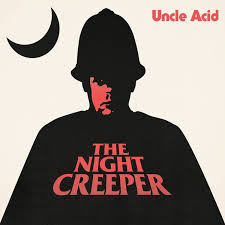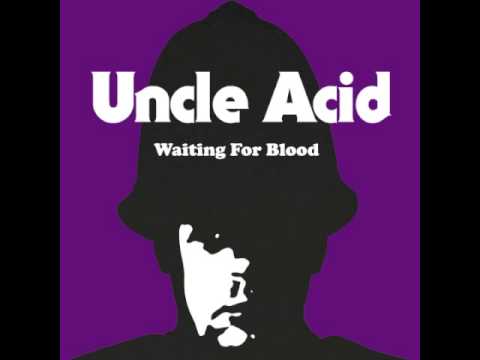As the internet scrubs clean our memories of what the past was really like (even as it theoretically makes more of it available than ever), it’s sometimes difficult to recall how aggressively atomised music used to be. Genres and their fans kept themselves to themselves, with heavy metal/hard rock in particular exiled to the outskirts of good taste. Cross-over into even the alternative mainstream was rare, with Guns N’ Roses perhaps being the first to achieve serious penetration in the indie kid market.
But slowly, barriers started to come down. Metallica made the next big transition, and then Queens Of The Stone Age in the early 00s. Uncle Acid & The Deadbeats are firmly in the same tradition, bearing many of the trappings of metal, but being entirely user-friendly, with every riff as finely honed as any modern day pop hook. It’s telling that both Black Sabbath and the Beatles are cited in The Night Creeper‘s press release, short-hand respectively for primal heaviousity and melodic songcraft. Similarly, main man Kevin Starr’s high-pitched, adenoidal voice acts as a signifier for both Ozzy and Lennon.
Starrs is clearly a very canny operator, Uncle Acid’s music skilfully managing to be both genuinely rocking and knowingly referential, describing the album as following an "aesthetic lineage as it descends from trash to noir to something discernibly darker…" While their breakthrough album Blood Lust was a perfect combination of bubblegum doom and pulp horror, 2013’s Mind Control felt a bit too serious in places, occasionally verging on ponderous. Happily, The Night Creeper sees a return to their earlier vibe, while introducing a little new colour.
‘Waiting For Blood’ immediately locks into that head-nodding groove, the relentless, leaden gait of its riff practically constant throughout the song. Uncle Acid’s peculiarly crunchy yet squelchy sound is also still very much in evidence, as though the master tape has been bounced down at least a couple of times from some ancient desk (it was recorded at Toe Rag Studios, so that’s a distinct possibility). The song’s up tempo coda flags their NWOBHM influence too, with nods throughout the album to the likes of Iron Maiden, Angelwitch and Witchfinder General. ‘Murder Nights’ follows the same pattern, sneaking in a cheeky reference to "electrifying enemies" (see Sabbath’s ‘Symptom Of The Universe’), while its hypnotic, abject riff is like primetime Butthole Surfers forced at gunpoint to write a top 30 hit.
‘Downtown’ has that slightly haughty, medieval metal feel to it, as though ripped from the soundtrack of some imaginary 70s folk horror film, its swooning backing vocals being a nice touch. By ‘Pusher Man’, you’ll swear you’ve heard that riff before – Vol. 4 maybe? – but it doesn’t matter, because you’re being irresistibly dragged down into a sludgy, druggy bed of rock…
Thank goodness then for ‘Yellow Moon’, a lovely pastoral prog instrumental, and a chance to splash some metaphorical water on the face. It’s at this point that I realise how much it reminds me of something by The Advisory Circle. It makes clear a connection with Ghost Box’s alternative nostalgia project, albeit Uncle Acid are tapping into a more proletariat seam of late night Hammer double-bills on BBC2, buying Axe Attack from Woolworths, and furtively drinking underage pints of cider and black in the one pub in town with Ted Nugent on the jukebox.
‘Melody Lane’ kicks the album’s second half off with renewed vigour, its anthemic Black Album swagger featuring a great singalong chorus, before we get to ‘The Night Creeper’ itself, based on another classic piece of ornate Iommi-esque riffery. Two observations here. Firstly, compared to Sabbath, there’s a lot less dynamic space in Uncle Acid’s music – in horror terms, we’re talking growing dread rather than sudden jump cuts. Secondly, because everything’s derived from a fictional narrative, it sometimes feels like there’s no face behind Uncle Acid’s mask – that’s not necessarily a complaint, but it can occasionally put the listener at one remove from the action.
On saying that, the album ends with a couple of stylistic diversions (three if you count the woozy acoustic hidden track of ‘Black Motorcade’). ‘Inside’ appropriates the glam thump of Slade’s ‘Coz I Love You’, and again makes you realise how much the light is usually snuffed out in Uncle Acid’s songs by moth-eaten velvet curtains and candle smoke. But it’s the extended ‘Slow Death’ that really impresses, the wave-like chime of guitar and random keys panning across the stereo evoking an atmosphere of spooky mellowness. It’s like early Fleetwood Mac have been led into the woods at night, out of their heads, Peter Green confronting the Green Manalishi of his nightmares. And just to ramp up the Blair Witch vibe, Starrs’ voice is bare and bleak, as though recorded while he stands in the corner with his back to the mic. It just keeps on going, getting gradually more intense, a trip that feels like it’s never going to stop.
If you’ve grown tired of the retro-metal sound of recent years, The Night Creeper is a good place to re-engage. Uncle Acid might not be sonic visionaries, but they’re masters of their craft.
<div class="fb-comments" data-href="http://thequietus.com/articles/18691-uncle-acid-the-deadbeats-the-night-creeper-review” data-width="550">



